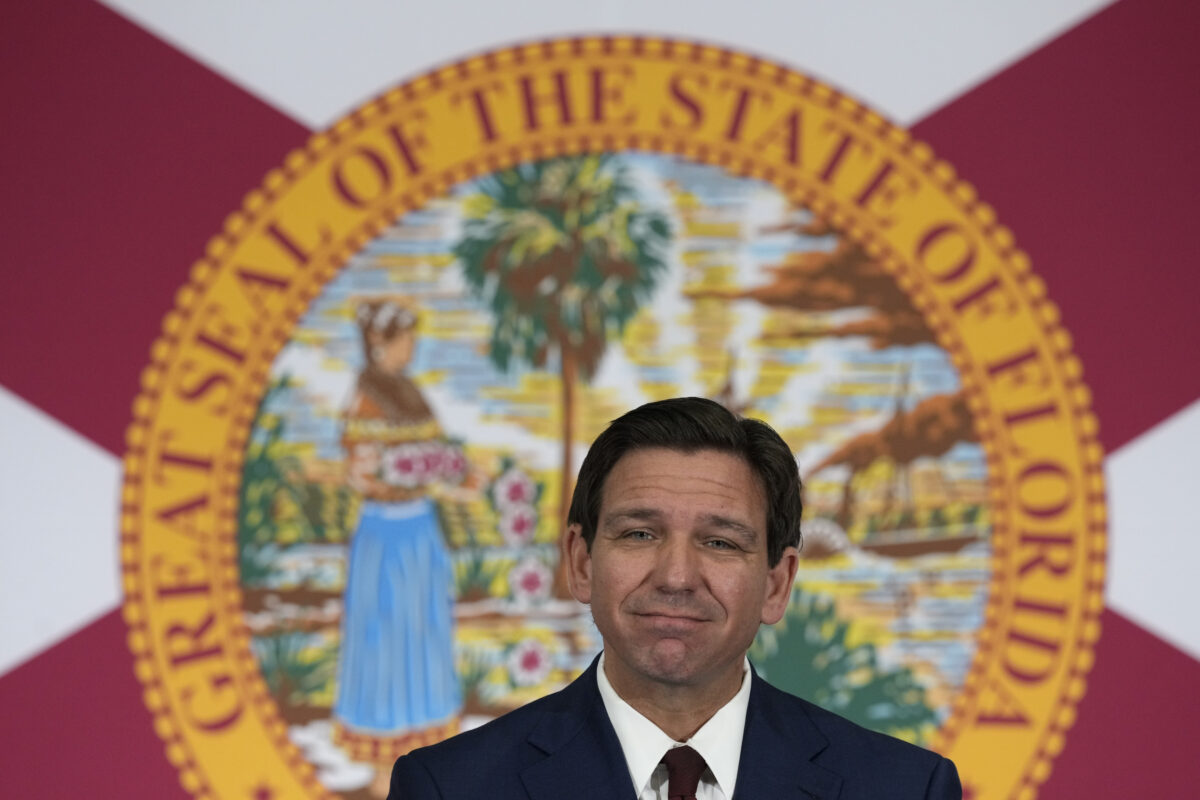DeSantis Puppet Board Just Leveled Their Pettiest Threat Yet in Disney Fight

AP Photo/Rebecca Blackwell
The puppet board appointed by Florida Gov. Ron DeSantis (R) in his ongoing war with Disney has now made, perhaps, their pettiest move yet: threatening to impose code enforcement fines on Disney subject to foreclosure, meaning they could theoretically be used to seize Disney’s property.
According to the Orlando Sentinel, DeSantis’ board has “created a code enforcement system that could issue fines to Walt Disney World, which is known for meticulous care of its grounds,” which would include imposing fines for code violations of up to $500 per day, all determined by a group of newly-appointed code enforcement officers, who would answer to the new administrator the board had selected (along with a substantial pay increase). The new program “would also authorize foreclosures on any liens.”
This increasingly bizarre mess started just over a year ago, with a milquetoast press release issued by the then-CEO Bob Chapek regarding the Parental Rights in Education bill (dubbed the “Don’t Say Gay” bill by many of its critics) after it passed. Many other companies criticized the legislation in far harsher terms before it passed, and Disney didn’t actually do anything about the bill after that press release, but it was enough to trigger DeSantis’ ire.
Well, more accurately, the Disney corporation presented an irresistible target for DeSantis’ presidential ambitions, helping him secure some of that sweet, sweet Fox News airtime as he sought to portray himself as a warrior knight of the culture wars. As DeSantis admitted in his book, he directed the GOP-controlled Florida legislature to rush through a bill targeting Disney: an ill-conceived, unconstitutional effort to repeal outright the Reedy Creek Improvement District (RCID), the special taxing district for Disney’s property that stretches across Orange and Osceola County.
DeSantis’ Cinderella Castle coup attempt was derailed by RCID’s outstanding municipal bond debt of over $1 billion that would become the debt of the county taxpayers if RCID was dissolved — a politically unpalatable development — so during the 2023 legislative session, his minions in the legislature rushed forward another bill that kept the main structure of RCID intact and took control of the board away from Disney and granted that appointment power to the governor.
But before DeSantis’ new puppet board could seize the reins, Disney and the existing RCID board entered into a new development agreement (a common legal instrument in Florida real estate development), essentially freezing the existing system in place, prohibiting the incoming board from using the Disney name or characters, and otherwise sharply limiting their power — all done at a publicly-announced, open-to-the-public RCID meeting that was recorded in the county public records.
Disney has filed suit in federal court, arguing that the plain language in an incredibly long list of comments by DeSantis and his allies proves their retaliatory intent, and therefore a violation of the First Amendment, in addition to other claims based on contract law. First Amendment jurisprudence has long held that the government cannot take otherwise legal action (and the RCID repeal and board takeover violate other provisions of Florida law) against a taxpayer as retaliation against the exercise of that taxpayer’s free speech rights.
DeSantis is a Harvard Law-educated attorney but still seemed to be openly inviting the First Amendment challenge to his actions, continuing to issue public threats against Disney. Last month, he openly speculated about having a competing park or even a prison built next to Walt Disney World, called for additional taxes to be imposed on Disney, and supported the passage of a bill that enacted new regulations and inspections on Disney’s monorail transportation system (and not Universal’s Hogwarts Express or any other element of any other theme park in the state).
Disney responded with an amended complaint, including these new threats and retaliatory bills passed in the waning days of the 2023 session.
Now, here’s where I’ll admit I made an error regarding DeSantis’ threat to build a prison next to Disney. I had originally misinterpreted those comments in a far less diabolical way than the governor intended, believing he was talking about using state-owned lands adjacent to the Disney parcel or encouraging other privately-owned parcels to be developed that way. I say “encouraging” because a large portion of the land next to Disney is owned by various entities connected to the state’s sugar industry, and as dumb as it is for my governor to battle with Mickey Mouse, taking on Big Sugar too is definitely gettin’ too big for his britches, as my grandma used to say.
When you look at DeSantis’ full quote about “what should we do with this land,” it seems far more likely that what he was actually suggesting was much worse: threatening to seize Disney’s property through eminent domain, a nuclear-level escalation in this already messy fight.
The company’s intention from the first visits to the Orlando area by Walt Disney himself in the 1960s was to purchase more land than they would ever use and preserve massive sections of it as green space. Disney’s motivations were driven by profits and wanting to have complete control over the guest experience at their parks, but the practical truth is that this decision has also been a great benefit to the people of Florida.
The Mouse’s parcel significantly overlaps with the Florida Wildlife Corridor, a critically important habitat for many endangered and threatened species, and because Disney maintains a level of environmental quality control in excess of any state or federal regulation, it also results in cleaner water for all the downstream parts of the state. Florida isn’t just surrounded by massive bodies of water on three sides; interconnected systems of lakes, rivers, and swamps above ground and the aquifer below ground mean that anything that affects water quality in one area can affect many other areas. We spend millions of taxpayer dollars every year trying to clean up agricultural pollution in Lake Okeechobee and the Everglades, fighting algae blooms, trying to replace dying-off plants that are crucial to manatee diets, and so on.
As I’ve pointed out repeatedly over the past year-plus that this charade has dragged on, RCID is not a tax break for Disney, but an extra tax in addition to the taxes it pays to both counties, a roughly $160 million annual budget which the company willingly pays in order to maintain a higher level of services, infrastructure, etc. than the counties could provide, then or now.
That’s how they pay for that high level of environmental quality. Avoiding toxic fertilizers and pesticides while maintaining lush landscaping in a subtropical environment teeming with potential pests does not come cheaply, and neither do the water treatment and flood mitigation endeavors that Disney undertakes, with that multimillion-dollar RCID budget.
The Sentinel report noted Disney “has prided itself on the maintenance of its parks and properties, which includes regular safety inspections,” but that isn’t even the tip of the iceberg on how Disney has managed its property under RCID for over fifty years. Locals here in Orlando joke all the time we would love for Mickey to take over I-4, a seemingly never-ending construction nightmare in comparison to Disney’s immaculately-maintained, pothole-free roadways. And as I wrote last December about the building codes:
The “EPCOT Codes,” Disney’s proprietary building codes, are extremely detailed and state-of-the-art, offering the highest level of hurricane protection and other safety measures. Three contractors who have done work at Disney whom I’ve interviewed for research on RCID (independently; they don’t know each other) called the EPCOT Codes “a pain in the a**,” but all acknowledged these demanding standards achieved a top level of safety, aesthetics, and improved guest experiences.
The suggestion from the governor and his puppet board that a new code enforcement regime is needed at Disney is beyond laughable, but the added threat of fines enforceable by foreclosure ratchets this all up to a despicably insane level. What possible code “violation” will DeSantis’ minions find as a pretext for seizing property in his quest for vengeance against a mouse who dared squeak one press release of criticism?
My prediction that Disney would file one amended complaint proved accurate, and I don’t feel like it’s much of a stretch to predict not just a second amended complaint listing these latest aggressions will soon pop up on the court docket, but also a motion by the clever Disney lawyers to seek temporary injunctive relief, barring DeSantis’ puppet board from continuing to take harmful actions against their property and business.
In the meantime, the governor is widely expected to launch his presidential campaign in the coming weeks, with a messaging strategy claiming that he can be Trump without the chaos and drama, but if attempting to overthrow the core infrastructure of one of your state’s largest employers and then seize their land isn’t chaos and drama, I’m not sure what is.
This is an opinion piece. The views expressed in this article are those of just the author.




